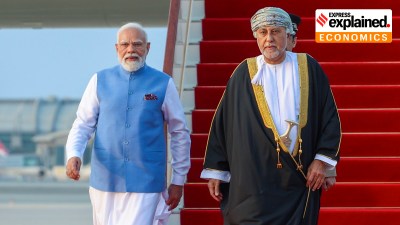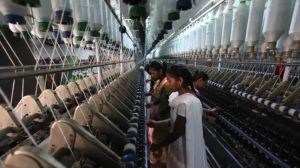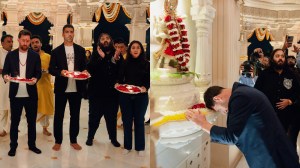Camel carts, puppets, vaccine songs: Taking the Covid shot to the deserts of Rajasthan
Vaccination in camel carts, songs about the vaccine in folk style, improv stand-up comedy, and an interactive puppet – how this Project is vaccinating people in and around the dunes of Rajasthan.
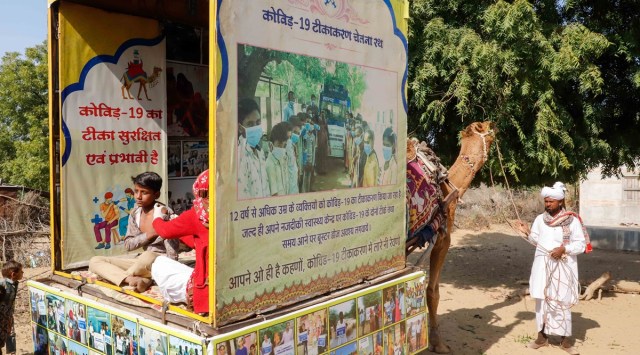 Health worker Chandravati administers a Covid vaccine shot inside a camel cart in Ramsar village of Rajasthan on 13 January 2023. (Express photo by Chitral Khambhati)
Health worker Chandravati administers a Covid vaccine shot inside a camel cart in Ramsar village of Rajasthan on 13 January 2023. (Express photo by Chitral Khambhati) “Registan ka jahaj hai ye” (This is the ship of the desert) says Islam Khan of Kantalkapar, walking with his camel in the desert region of Ramsar – 30 km from the India-Pakistan border – in Rajasthan. The only way for the COVID-19 vaccines to reach the people residing in the dunes of Ramsar block was on camel carts.
 (Islam Khan walks with his camel cart on a dune in Ramsar village of Rajasthan on January 13, 2023. Express photo by Chitral Khambhati)
(Islam Khan walks with his camel cart on a dune in Ramsar village of Rajasthan on January 13, 2023. Express photo by Chitral Khambhati)
 (A vaccination camel cart walks on the street of Ramsar village on 13 January 2023. Express photo by Chitral Khambhati)
(A vaccination camel cart walks on the street of Ramsar village on 13 January 2023. Express photo by Chitral Khambhati)
Khan carries Chandravati, a public health worker designated as an ANM (Auxiliary Nurse and Midwife), in the camel cart to the Saurupani village, also called Bhilo ki basti, of Ramsar. The village has a population of around 500 people living in 70 houses, according to locals. The vaccine mission Khan and Chandravati are on is part of Project MOMENTUM Routine Immunization Transformation and Equity.
Supported by USAID, the Project is being implemented by John Snow India Pvt Ltd in collaboration with the government and works with local NGOs to increase Covid-19 vaccination coverage, particularly for vulnerable and marginalised populations, in 18 states across India.
The Rajasthan government has been strengthening efforts to reach each person, and these interventions were carried out under the state government’s guidance.
 MOMENTUM Routine Immunization Transformation and Equity Project, supported by USAID, is implemented in India by John Snow India Pvt Ltd.
MOMENTUM Routine Immunization Transformation and Equity Project, supported by USAID, is implemented in India by John Snow India Pvt Ltd.
“The people feared that the vaccine would make men impotent and harm the foetus in pregnant women,” says Chandravati after vaccinating some children of Saurupani. These were some of the rumours men talked about when they gathered at the tented shop in the village.
 (Chandravati, a public health worker (ANM), rides in a camel cart on a dune in Ramsar village of Rajasthan on January 13, 2023. Express photo by Chitral Khambhati)
(Chandravati, a public health worker (ANM), rides in a camel cart on a dune in Ramsar village of Rajasthan on January 13, 2023. Express photo by Chitral Khambhati)
 (Children chase a vaccination camel cart on a dune in Ramsar village of Rajasthan on January 13, 2023. Express photo by Chitral Khambhati)
(Children chase a vaccination camel cart on a dune in Ramsar village of Rajasthan on January 13, 2023. Express photo by Chitral Khambhati)
Five troops of camel carts with ANMs and a camel driver were deployed in the dunes of Siyai, Nai siyai, Bhilo ka par, Saurupani and Sangrani villages of Ramsar for COVID-19 vaccination.
The men of Saurupani work in the fields for four months to grow crops, and work as labourers in the states of Gujarat, Maharashtra, Uttar Pradesh and Karnataka for the remaining year. Women operate stitching machines and engage in animal husbandry in the village.
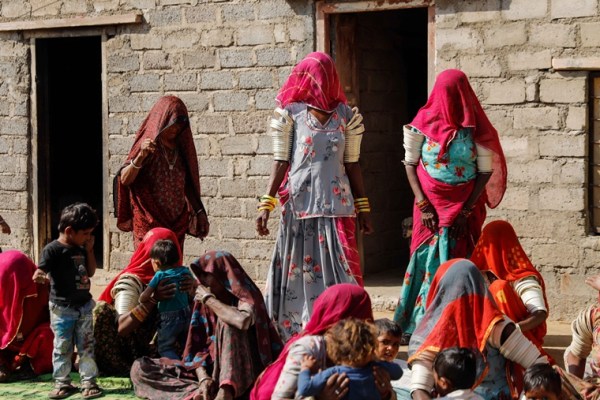 (Baju Devi (centre) walks in a gathering at a house in Ramsar, Rajasthan on January 13, 2023. Express photo by Chitral Khambhati)
(Baju Devi (centre) walks in a gathering at a house in Ramsar, Rajasthan on January 13, 2023. Express photo by Chitral Khambhati)
Hema Ram, 30, says that no deaths occurred in the village due to the coronavirus and people who returned from other states were the only ones who were infected. “Villagers were afraid when they saw videos of dead bodies on TV news channels,” he added.
“In the beginning, we had the misconception that we may die if we take the vaccine,” said Baju Devi, 45. “The elders of the village were more afraid.”
Educated youth speaking to their families, awareness campaigns with the Project, and connecting with people on WhatsApp were the initial steps the gram panchayat took to convince the people to vaccinate.
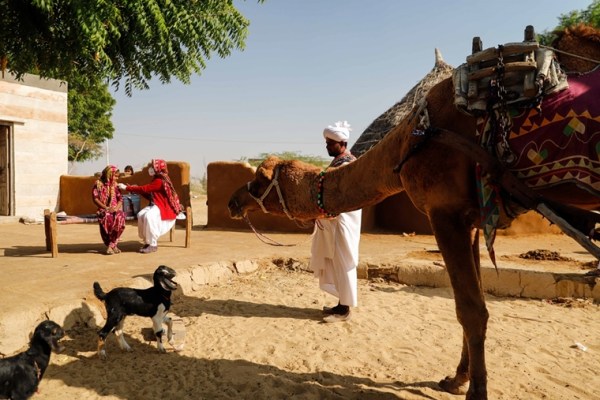 (Health worker Chandravati administers a Covid vaccine shot on a juvenile girl in Ramsar, Rajasthan on 13 January 2023. Express photo by Chitral Khambhati)
(Health worker Chandravati administers a Covid vaccine shot on a juvenile girl in Ramsar, Rajasthan on 13 January 2023. Express photo by Chitral Khambhati)
Jeet Parmar, 23, the youngest Sarpanch in the state of Rajasthan said, “It was very difficult (to convince people). Villagers used to run away as soon as they heard the word ‘vaccine’.”
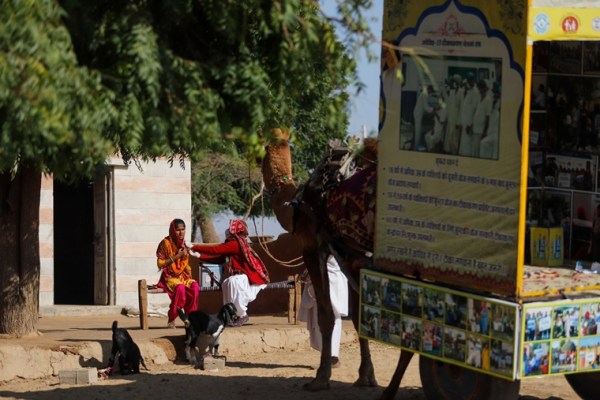 (Health worker Chandravati administers a Covid vaccine to on a young girl in Ramsar, Rajasthan on January 13, 2023. Express photo by Chitral Khambhati)
(Health worker Chandravati administers a Covid vaccine to on a young girl in Ramsar, Rajasthan on January 13, 2023. Express photo by Chitral Khambhati)
Currently, children between the age of 12 and 18 are being administered the second dose of the COVID-19 vaccine in Saurupani.
Raatri Chaupal
In Babuguleriya village of Ramsar, misconceptions and myths about vaccines were as prevalent. The Project collaborated with folk singers and performers to raise awareness about the COVID vaccines among people.
Bauju Pradhan, chief of the village, was the first person to get vaccinated in Babuguleriya. “I got the vaccine first when people were scared of it,” she says as she waits for the raatri chaupal to begin.
 (Chief of village Bauju Pradhan sits as Sarita stands behind her before vaccination awareness performances at a raatri chaupal in Babuguleriya, Rajasthan on January 13, 2023. Express photo by Chitral Khambhati)
(Chief of village Bauju Pradhan sits as Sarita stands behind her before vaccination awareness performances at a raatri chaupal in Babuguleriya, Rajasthan on January 13, 2023. Express photo by Chitral Khambhati)
“If even one person was missed, the whole village could be at risk,” says Sarita, 31, a Project official, adding that they went to each and every house in the village to inform them about the vaccine.
Jamal Khan, 47, is a manganiyar – a traditional folk singer – who sings at various events in the state usually about rain, trees, and nature. Since March 2022, Khan along with his troop has performed vaccine awareness songs in the folk style in about 250-300 raatri chaupals (nightly village gatherings).
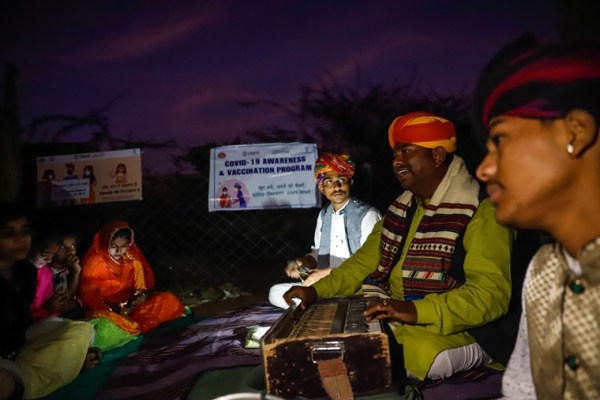 (Jamal Khan and his troop perform a song about Covid vaccination in folk style during a raatri chaupal in Babuguleriya, Rajasthan on January 13, 2023. Express photo by Chitral Khambhati)
(Jamal Khan and his troop perform a song about Covid vaccination in folk style during a raatri chaupal in Babuguleriya, Rajasthan on January 13, 2023. Express photo by Chitral Khambhati)
“We faced many many many difficulties. Some villages were so scared of the vaccine, they did not let us enter,” Khan says before preparing for a performance in Babuguleriya village. Apart from singing the songs they composed, the troop also held discussions with people to clear their misconceptions regarding the vaccine. Some elders were worried that they might get paralysed after taking the vaccine shot, he said.
Jamal Khan and his troop have performed in Ramsar, Gadhra, Barmer, Baitu, Jaisalmer, Fatehgarh, and several other blocks. “Where we faced most challenges were the places we achieved the most vaccination,” Khan said with a proud smile.
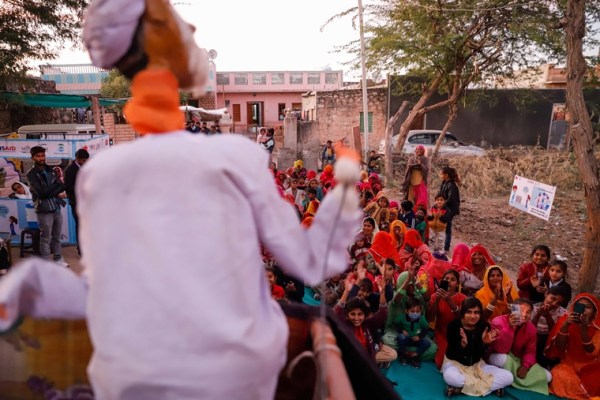 (Villagers of Babuguleriya watch a puppet show of Gyaani Baba performed by Lal Puri Goswami during a raatri chaupal in Rajasthan on January 13, 2023. Express photo by Chitral Khambhati)
(Villagers of Babuguleriya watch a puppet show of Gyaani Baba performed by Lal Puri Goswami during a raatri chaupal in Rajasthan on January 13, 2023. Express photo by Chitral Khambhati)
The raatri chaupal is joined by Gyaani Baba, a puppet, and Dr. Popat, a character performed by Lal Puri Goswami, a theatre artist from Bikaner. Goswami says that his characters connect with the audience because of his knowledge of their culture and language.
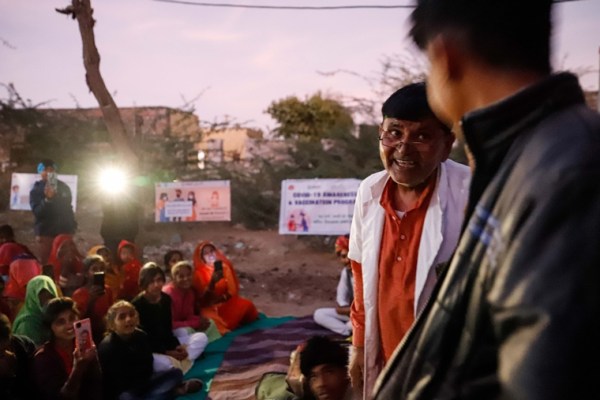 (Lal Puri Goswami performs a comic act as Dr. Popat during a raatri chaupal in Babuguleriya, Rajasthan on January 13, 2023. Express photo by Chitral Khambhati)
(Lal Puri Goswami performs a comic act as Dr. Popat during a raatri chaupal in Babuguleriya, Rajasthan on January 13, 2023. Express photo by Chitral Khambhati)
Goswami performs interactive improv stand-up to highlight misconceptions about the coronavirus vaccine. “Once we went to a village in our car, stones were hurled at us,” he said. He says the ‘best thing’ is that people get vaccinated on the side while he performs at gatherings.
 (Children watch a puppet show by Lal Puri Goswami during a raatri chaupal in Babuguleriya, Rajasthan on January 13, 2023. Express photo by Chitral Khambhati)
(Children watch a puppet show by Lal Puri Goswami during a raatri chaupal in Babuguleriya, Rajasthan on January 13, 2023. Express photo by Chitral Khambhati)
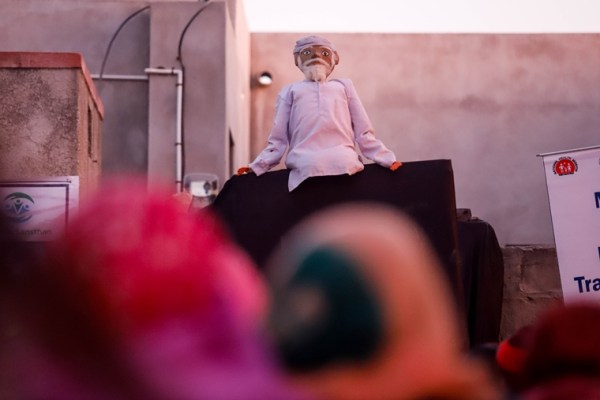 (Lal Puri Goswami’s puppet Gyaani Baba during a performance at a raatri chupal in Babuguleriya, Rajasthan on January 13, 2023. Express photo by Chitral Khambhati)
(Lal Puri Goswami’s puppet Gyaani Baba during a performance at a raatri chupal in Babuguleriya, Rajasthan on January 13, 2023. Express photo by Chitral Khambhati)
Convincing the villagers in areas that had an uneducated population was particularly challenging for public health workers. Saroj, an ANM for 2.5 years from Tambaliyar, took her son to a village and administered him the second dose there to make people believe that the vaccine was not harmful. “I would not kill my child with my own hands, right?” she asked, to encourage the gathering for vaccination.
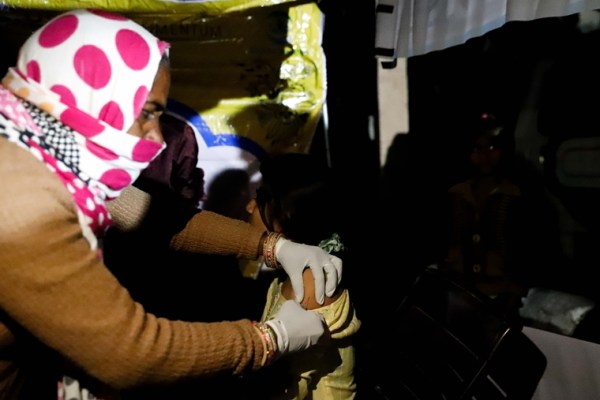 (A health worker, Jonbai, vaccinates a young girl after a raatri chaupal at a makeshift tent in Babuguleriya, Rajasthan on January 13, 2023. Express photo by Chitral Khambhati)
(A health worker, Jonbai, vaccinates a young girl after a raatri chaupal at a makeshift tent in Babuguleriya, Rajasthan on January 13, 2023. Express photo by Chitral Khambhati)
Baal Mela
Another vaccination awareness campaign by the Project in Rajasthan schools is Baal Mela (Children’s Fare), where various inter-class competitions are organised to create coronavirus awareness. On the side, COVID vaccinations are carried out in schools.
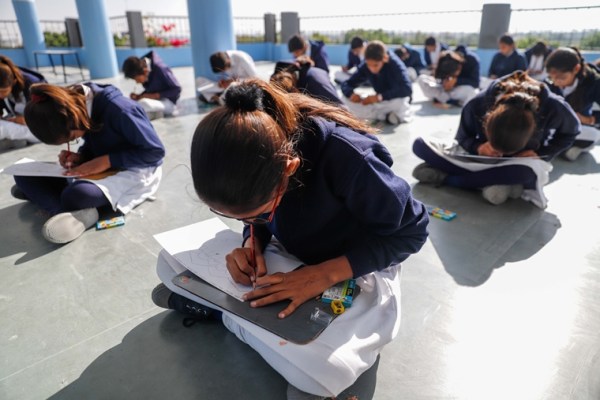 (Students of Doongar Vidyapeeth school participate in a drawing competition during a Baal Mela in Barmer, Rajasthan on January 14, 2023. Express photo by Chitral Khambhati)
(Students of Doongar Vidyapeeth school participate in a drawing competition during a Baal Mela in Barmer, Rajasthan on January 14, 2023. Express photo by Chitral Khambhati)
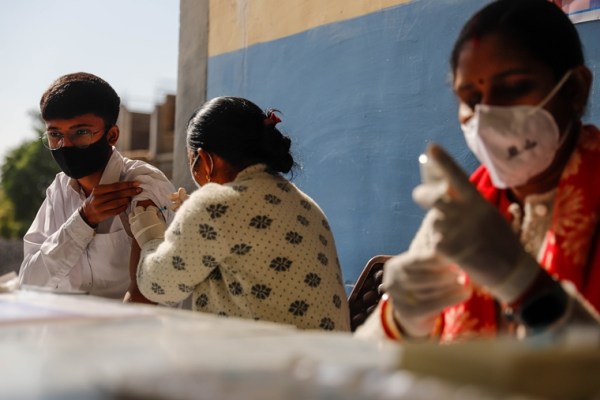 (A student gets vaccinated by a health worker at Doongar Vidyapeeth school in Barmer, Rajasthan on January 14, 2023. Express photo by Chitral Khambhati)
(A student gets vaccinated by a health worker at Doongar Vidyapeeth school in Barmer, Rajasthan on January 14, 2023. Express photo by Chitral Khambhati)
Disclaimer: MOMENTUM Routine Immunization Transformation and Equity Project, supported by USAID is implemented in India by John Snow India Pvt Ltd in close collaboration with the Government of India to strengthen their outreach and delivery efforts with communities for vaccination; and through partnerships with local NGOs to increase demand, distribution and uptake of COVID-19 vaccination, particularly for vulnerable and marginalized populations across selected 18 states of India. (Visit: https://usaidmomentum.org/)
- 01
- 02
- 03
- 04
- 05


